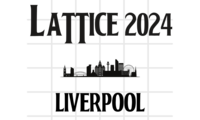Speaker
Description
Thermodynamic studies of gauge theories in the presence of a finite fermionic density and in real-time, out-of-equilibrium processes, can be facilitated by Hamiltonian-simulation methods, such as tensor networks and quantum computing. A suitable framework for such studies is quantum thermodynamics, a subfield of thermodynamics that extends traditional thermodynamics to quantum systems. Due to the intricate structure of lattice-gauge-theory Hilbert spaces rooted in Gauss's laws, the partitioning of states defined over a system and reservoir is nontrivial, mimicking the situation occurred in strong-coupling thermodynamics. Consequently, the system's internal energy, and its division to work and heat exchanged during a thermodynamic process, must be defined carefully. We propose definitions consistent with first and second laws of thermodynamics, and use them to study a spontaneous quench process in a simple 1+1 D lattice gauge theory. Thermodynamic quantities are seen to exhibit enhanced sensitivity to a phase transition in this model compared with when traditional weak-coupling thermodynamics are applied. Quench processes are the simplest non-equilibrium processes studied in quantum-simulation experiments nowadays. We demonstrate how certain thermodynamic quantities can be efficiently measured in these experiments using entanglement-tomography tools in quantum-information theory.

